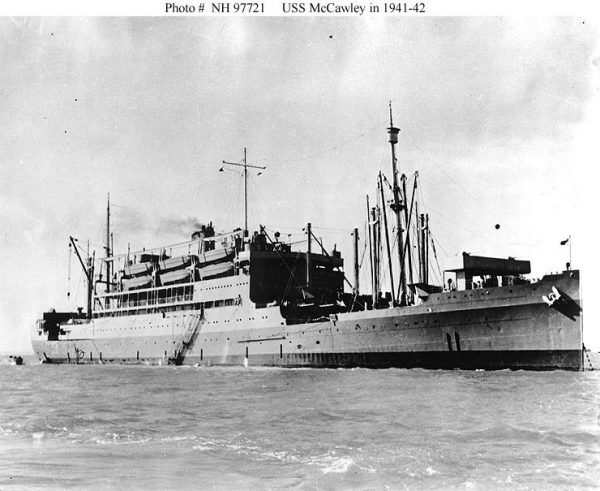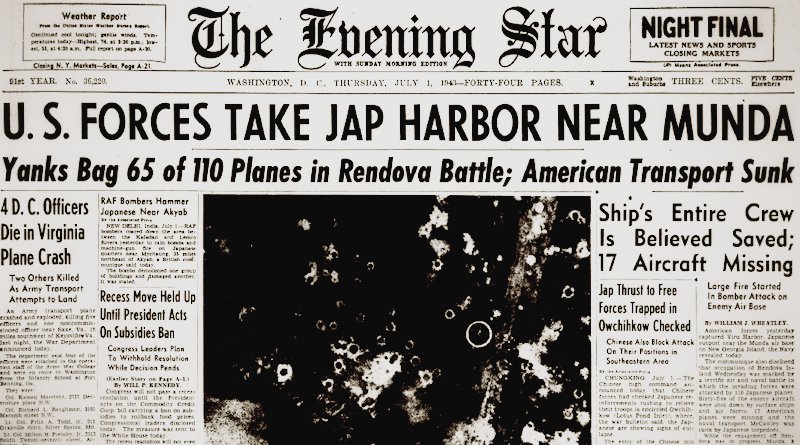World War II Chronicle: July 1, 1943
Click here for TODAY’S NEWSPAPER
A day after landing at Rendova Island, American troops have taken Viru Harbor on nearby New Georgia island. The harbor lies about 25 miles east of the Japanese airbase at Munda. The attack transport USS McCawley was sunk after disembarking her troops. 15 sailors were killed by the torpedo blast, which disabled the ship. Salvage operations were underway when the vessel was struck a second time while being towed to friendly facilities.

Prowling American PT boats spotted the ship last night and were informed that no friendlies are in the area. It is a U.S. Navy torpedo (not a Japanese sub as indicated by the newspaper) that finishes off McCawley and she sinks in 30 seconds. Between the Guadalcanal and New Georgia campaigns her crew had earned five battle stars. This size of transport could carry roughly 1,300 combat troops in addition to her crew of 478 officers and men. No one lost their lives when the ship was sunk, but if McCawley was loaded, like when she carried the 1st Marine Raiders and 3rd Parachute Battalion from Guadalcanal to New Caledonia last year, that would have been devastating…
George Fielding Eliot discusses the New Georgia operation on page 12… Sports begin on page 20, which announces the roster for the 1943 All-Star game. This marks the 11th contest between the Junior an Senior circuits, with Joe McCarthy of the Yankees managing the American club and the Cardinals’ Billy Southworth heading the Nationals. This will be Stan Musial’s first of a record 24 All Star appearances. The National League features two sets of brothers, and this will be the 10th appearance for Bill Dickey, Billy Herman, and Mel Ott.
1943 American League All-Star Team
| Bill Dickey | C | New York | 10th selection |
| Bob Johnson | OF | Washington | 6th |
| Joe Gordon | 2B | New York | 5th |
| Luke Appling | SS | Chicago | 5th |
| Ken Keltner | 3B | Cleveland | 4th |
| Lou Boudreau | SS | Cleveland | 4th |
| Rudy York | 1B | Detroit | 4th |
| Bobby Doerr | 2B | Boston | 3rd |
| Charlie Keller1Keller is injured and is replaced by Detroit’s Dick Wakefield | OF | New York | 3rd |
| Buddy Rosar | C | Cleveland | 2nd |
| Dutch Leonard | P | Washington | 2nd |
| George Case | OF | Washington | 2nd |
| Hal Newhouser | P | Detroit | 2nd |
| Jeff Heath | P | Cleveland | 2nd |
| Jim Bagby | P | Cleveland | 2nd |
| Spud Chandler | P | New York | 2nd |
| Tex Hughson | P | Boston | 2nd |
| Tiny Bonham | P | New York | 2nd |
| Al Smith | P | Cleveland | 1st |
| Chet Laabs | OF | St. Louis | 1st |
| Dick Siebert | 1B | Philadelphia | 1st |
| Jake Early | C | Washington | 1st |
| Johnny Lindell | OF | New York | 1st |
| Oscar Judd | P | Boston | 1st |
| Vern Stephens | SS | St. Louis | 1st |
1943 National League All-Star Team
| Billy Herman | 2B | Brooklyn | 10th |
| Mel Ott | OF | New York | 10th |
| Ernie Lombardi | C | New York | 7th |
| Frank McCormick2McCormick is injured and is replaced by Pittsburgh’s Elbie Flecher | 1B | Cincinnati | 6th |
| Eddie Miller | SS | Cincinnati | 4th |
| Johnny Vander Meer | P | Cincinnati | 4th |
| Stan Hack | 3B | Chicago | 4th |
| Bill Nicholson | OF | Chicago | 3rd |
| Claude Passeau | P | Chicago | 3rd |
| Lonny Frey | 2B | Pittsburgh | 3rd |
| Mickey Owen | C | Brooklyn | 3rd |
| Augie Galan | OF | Brooklyn | 2nd |
| Mort Cooper | P | St. Louis | 2nd |
| Walker Cooper | C | St.Louis | 2nd |
| Al Javery | P | Boston | 1st |
| Babe Dahlgren | 1B | Philadelphia | 1st |
| Dixie Walker | OF | Brooklyn | 1st |
| Harry Walker | OF | St. Louis | 1st |
| Howie Pollet3Pollet is injured and is replaced by New York’s Ace Adams | P | St. Louis | 1st |
| Marty Marion | SS | St. Louis | 1st |
| Max Lanier | P | St. Louis | 1st |
| Rip Sewell | P | Pittsburgh | 1st |
| Stan Musial | OF | St. Louis | 1st |
| Vince DiMaggio | OF | Pittsburgh | 1st |
| Whitey Kurowski | 3B | St. Louis | 1st |
Roving Reporter by Ernie Pyle
NORTH AFRICA — (by wireless) — Now the time has come to talk about the mail. My mail, I mean.
Back in those first months in Africa I didn’t get any mail at all. My friends and family were writing all the time, of course, but the letters just never came through. It was terrible to go month after month with no word from home at all.
But now the tide has turned. I am known as the man who gets all the mail. If fewer than six letters a day come in, I start pouting and they have to give me extra rations of jam at suppertime.
I’m surprised that the army postal system doesn’t use its influence to get me kicked out of Africa on the grounds that I’m an impediment to the war effort, and also a nuisance.
You folks who read the column have been thoughtful and generous in writing to me. You have written letters by the hundreds, and they have all been grand to read. You have written me in red ink, green ink, by typewriter and by pencil. You have cabled me and you have sent notes by friends coming over. There have been letters from generals’ wives, from aircraft workers, from old schoolmates, shipyard presidents, school kids, Pacific heroes, and hundreds of letters from mothers and fathers of soldiers in Africa.
Most of you have written only once, but there have been series of as many as 15 and 20 letters from the same person. One reader, a complete stranger to me, has written me oftener than my own family. I’m on several “buddy” lists of people who write weekly to 50 or 60 overseas soldiers.
Some of you tell me your life histories or experiences in the last war, or what you are having for supper. You’ve given me remedies for sore hands and advice on how to break a pet dog of being battle-shy. You’ve sent me drawings of improvised stoves for pup tents, and you’ve asked me to call and have dinner with long unseen French aunts in Oran and Algeria. You’ve sent Christmas cards and sickroom cards and homemade poems and home-drawn cartoons. You’ve sent photographs of yourselves, and newspaper clippings by the hundred.
Many of you have written of sending me boxes of cigarets, soap, shaving lotions, books, cookies, nail scissors and sweaters. None of these have ever come, but the mere fact that you sent them is sufficient.
You mustn’t send anything more, because in the first place the stuff is likely not to get here, and in the second place there isn’t a thing in the world we need that we don’t have. That goes for most of the troops, too. We are well provided for, so don’t worry about us.
I could write a whole column about the unusual addresses you put on your letters. You send my letters to your husband’s A. P. O. number or in care of some soldier I have written about, or to the Stars and Stripes, or in care of General Eisenhower, who wouldn’t know me if he saw me.
Sometimes you merely clip my picture out of the column and paste it on an envelope. But most of you address your letters just “Somewhere in Africa,” or “On the Tunisian Front.” Hundreds of these probably never reach me at all, but other hundreds do. The ironic thing is that many of these vaguely addressed letters come through faster than correctly addressed ones from personal friends. In tracking me down these letters go through many hands. I’ve had penciled notes on the outside of envelopes from soldiers I hadn’t heard of in years. And some mystery person keeps printing on letters that come from different parts of the country and at different times, but always in the same hand. My only conclusion is that it must be done by a censor. Of all people!
Many of your letters make the rounds of a dozen units and get to me as much as six months after being sent. Just the other day I got one that was mailed in New York in December. The envelope was so covered with penciled notations that you could hardly find the name. But what tickled me the most was that some wishfully thinking postal clerk had sent it to three different prison camps, trying to locate me. It was all penciled out there on the envelope. One of the notation said, “Not at diplimary barracks.” If the Army is going to make a criminal out of me I do wish they’d learn how to spell “disciplinary” first.
Evening star. (Washington, D.C.), 1 July 1943. Chronicling America: Historic American Newspapers. Lib. of Congress.
https://chroniclingamerica.loc.gov/lccn/sn83045462/1943-07-01/ed-1/
